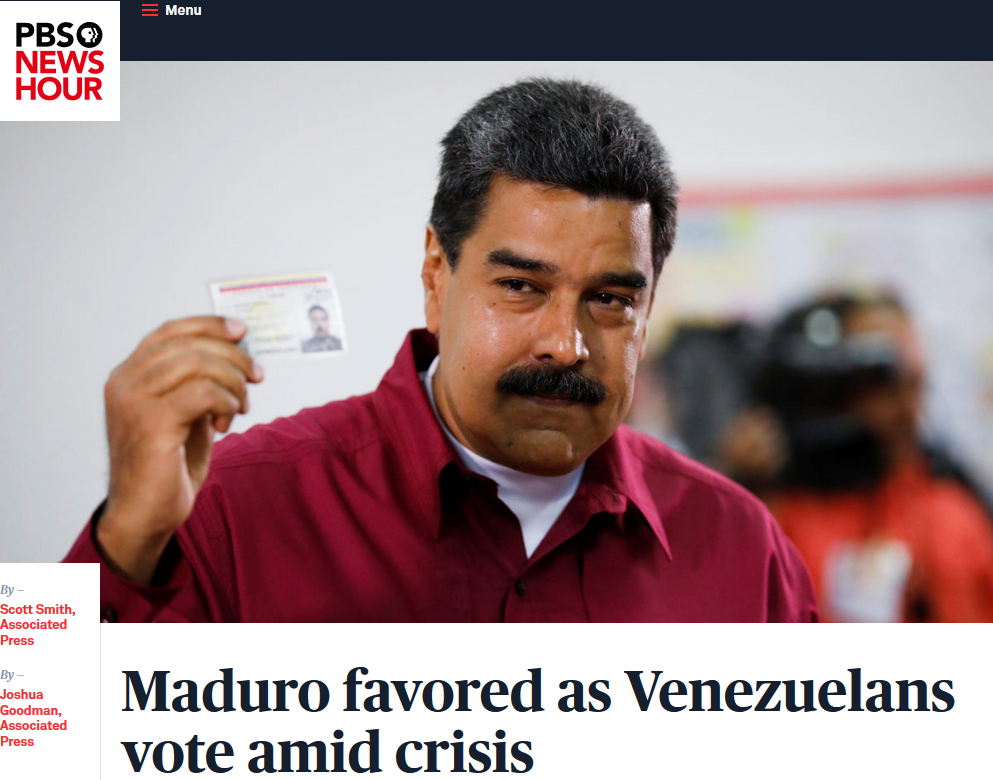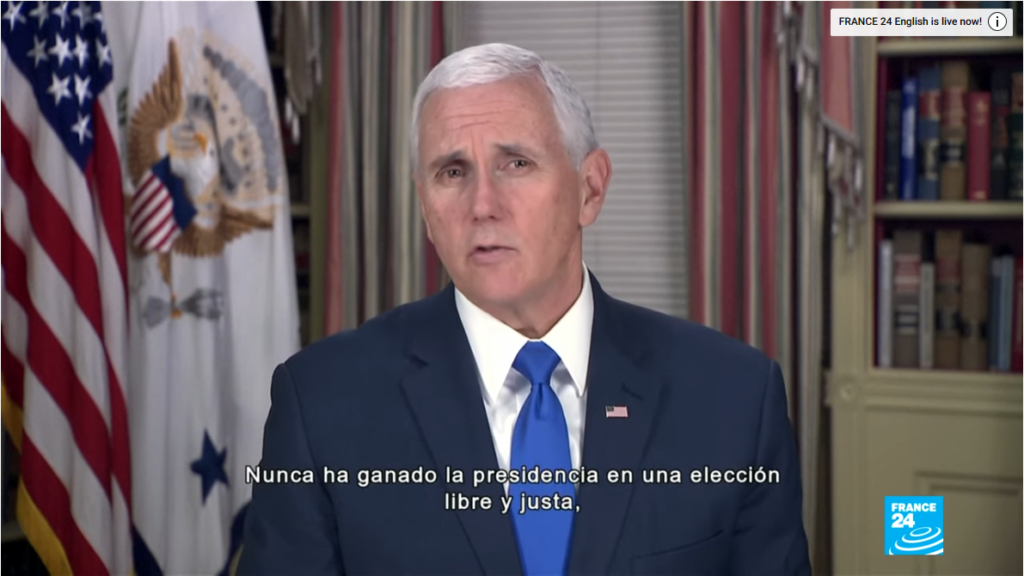 |
‘Resistance’ Media Side With Trump to Promote Coup in Venezuela
view post on FAIR.org
by Alan MacLeod
We like to think we have an adversarial media—one that will stand up, in particular, to Donald Trump. The media assured us that they would perform their crucial democratic role in holding this dangerous new president and commander-in-chief accountable at every turn. This struck a chord with the public; in the wake of Trump’s victory in 2016, the New York Times added over a quarter-million digital subscribers in a matter of weeks. “Democracy,” after all, “Dies in Darkness,” as the Washington Post tells us on every webpage.
Yet on Trump’s support for regime change in Venezuela, the “resistance” media are lining up shoulder to shoulder with the president.
After winning re-election in 2018, President Nicolás Maduro of Venezuela was recently sworn in for a second term. However, Trump has taken the extraordinary step of declaring the elections void, condemning the “illegitimate Maduro regime.” He also arranged to have National Assembly head Juan Guaidó—someone who has never even run for president, whom even the New York Times (1/22/19 ) describes as “virtually unheard-of”—name himself the country’s new leader. This has spurred the Venezuelan right wing onto the streets to try to force Maduro out of office, leading to the deaths of 14 people in the first two nights of clashes between large pro- and anti-government demonstrations.
Last year, the Trump administration preemptively declared as fraudulent the elections they had previously been demanding, instructing the opposition (whom the US has been funding for two decades) to boycott the process. It even tried to “persuade” (i.e., intimidate) opposition presidential candidate Henri Falcón not to run.
With complete unanimity of outlook, the supposedly oppositional US media served to delegitimize the elections as well (FAIR.org, 5/23/18), with the New York Times (5/20/18) describing them as “heavily rigged” and the Miami Herald (5/2/18) christening them “fraudulent,” a “sham,” a “charade” and a “joke” in one column alone. Yet this perception of events can only be sustained through the careful curation of information: informing readers of certain facts, while ignoring strong evidence to the contrary.
The Careful Curation of Information

Maduro’s re-election was widely anticipated in US media (e.g., PBS NewsHour, 5/20/18), though his victory now is generally dismissed as fraud.
The idea that the 2018 elections were, at best, highly questionable is taken as a fact across the media. For instance, CNBC (1/23/19) stated that Maduro’s re-election “was widely viewed as a sham due to widespread election irregularities”; Reuters (1/23/19) said the vote was “widely viewed as fraudulent.”
In reality, Venezuela has one of the most intensely monitored election system in the world, and the government called on the United Nations to send observation teams. This was blocked by the US on the grounds that the UN would “validate” the elections. Despite this, numerous international election monitoring organizations attended and attested to the vote’s quality. For example, the report of the African Nations’ delegation stated:
The Venezuelan people who chose to participate in the electoral process of May 20 were not subject to any external pressures, and carried out their right to vote in a peaceful and civil manner which we commend. As such, we implore the international community to abide by international law and the principles of self-determination and recognize what we consider to be a free, fair, fully transparent and sovereign election.
Maduro’s re-election was widely anticipated in establishment media, with campaign polls indicating that many opposition voters planned to sit out the election. “Maduro Favored as Venezuelans Vote Amid Crisis” was the headline of a PBS NewsHour story (5/20/18), which went on to explain:
While polls show Venezuelans overwhelmingly blame Maduro for their mounting troubles, he’s still heavily favored to win thanks to a boycott of the election by his main rivals.
The current protests are almost universally framed in corporate media as a democratic people’s uprising, akin to the Arab Spring, rather than a contested civil conflict, or even as a US-supported coup attempt, as alternative media are presenting it (Democracy Now!, 1/18/19; Real News, 1/23/19; The Canary, 1/23/19). “Coup” is a word avoided by corporate media when not quoted from Maduro or his supporters; as Reed Richardson noted, an AP profile ( 1/24/19 ) of Guaido referred to his naming himself president as a “standoff,” a “challenge,” an “uprising,” a “frontal assault on Maduro’s authority” and a “restoration of Venezuela’s democracy”—but never a “coup.”
The New York Times (1/23/19) noted that Guaidó was “cheered on by thousands of supporters in the streets and a growing number of governments, including the United States.” CNN (1/23/19) reported a vast, energetic movement around him, as “Venezuelans took to the streets in nationwide protests,” while CNBC (1/23/19) claimed there were “hundreds of thousands of Venezuelans” out on the streets, chanting together and waving national flags, demanding an end to Maduro’s “socialist government.” Bloomberg (1/23/19) worried that the leftist government would “crush” the protests. Yet there was very little mention, let alone coverage, of counter-protests across the country that complicate the picture.
Ignoring the US Role
The Times article also provides the context of the dire economic circumstances the country finds itself in, suggesting that this was the reason people are in the streets, and not in response to Trump’s call: “Citizens of what was once one of the region’s wealthiest nations, endowed with plentiful oil, have starved to death and died from preventable diseases,” the piece claimed. It fails to acknowledge the substantial US role in Venezuela’s economic and political crisis.
Trump ramped up the Obama administration’s sanctions, an action that caused Venezuelan oil production to plummet (FAIR.org, 12/17/18) and the economy to nosedive. Furthermore, US economic warfare against the country has cut Venezuela off from global capital markets—with the Trump administration threatening bankers with 30 years in prison if they negotiate with Caracas a standard restructuring of its debt (AlterNet, 11/13/17). The UN Human Rights Council formally condemned the US, noting that the sanctions target “the poor and most vulnerable classes,” called on all member states to break them, and even began discussing reparations the US should pay to Venezuela.
The US has long supported regime change in Venezuela, going back at least to the abortive coupagainst President Hugo Chavez in 2002. It has also spent a fortune through the National Endowment for Democracy and USAID to prop up opposition groups inside the country. Trump recently appointed neocon Iraq War architect John Bolton as national security advisor, who wasted little time in declaring Venezuela, Cuba and Nicaragua a “troika of tyranny,” echoing the infamous “axis of evil” moniker he employed during the Iraq War. Yet this crucial context in understanding the situation is missing from news accounts.
A Lapse of Factchecking

Corporate media passed on the chance to factcheck Trump administration claims about Venezuela.
Resistance media have made it a point of pride to vigorously factcheck and scrutinize every one of the administration’s statements; the Washington Post (12/30/18) recently calculated that Trump makes an average of 15 false claims per day. And yet, when it comes to Venezuela, the administration’s dubious claims are taken at face value.
For example, in a recorded message, VP Mike Pence stated:
Nicolas Maduro is a dictator with no legitimate claim to power. He has never won the presidency in a free and fair election, and has maintained his grip of power by imprisoning anyone who dares to oppose him.
This announcement was picked up across the media, including by Reuters (1/22/19), ABC News(1/23/19), Newsweek (1/22/19), the Los Angeles Times (1/22/19) and MSN (1/23/19 ). Yet none of these organizations factchecked this claim, allowing it to stand unchallenged as the basis of a story, further bolstering the dominant narrative.
This was not a difficult claim to debunk. Maduro won his first election in 2013, recognized by every country in the world except the US, and which even the Washington-funded organization the Carter Center declared free and fair. Indeed, former President Jimmy Carter in 2012 stated the Venezuelan election system to be the “best in the world.”
It was considered a shameful anti-democratic misstep when the New York Times’ editorial board (4/13/02) endorsed the 2002 coup. Yet for more than a year, US media have been openly calling for another one (FAIR.org, 5/16/18). The Washington Post (11/15/17 ) ran with the headline, “The Odds of a Military Coup in Venezuela Are Going Up. But Sometimes Coups Can Lead to Democracy.” For a media so focused on allegations of foreign interference in US politics, it is remarkable how accepting they are of Trump becoming personal moral arbiter of Venezuela.
It is revealing how the supposedly anti-Trump media have closed ranks and are marching in lockstep with the administration when it comes to overthrowing Washington’s official enemies. The media are not opposing Trump or tyranny; they are enabling it.
Research assistance: Teddy Ostrow
|
|
Comments
Post a Comment